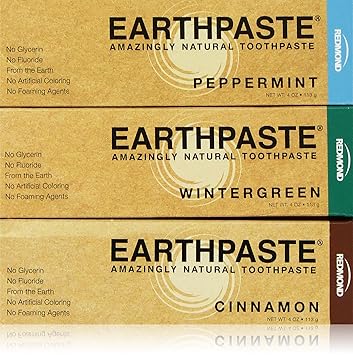A peek at Nature's little secrets for oral hygiene.
Dental Hygiene products that you and your family use every day may contain toxins that have been linked to blindness cancer and even death. So when you reach for the toothpaste or mouth wash recall this information list of harmful added ingredients.
Sodium Fluoride: The main ingredient in toothpaste and rat poison
Dental Hygiene products that you and your family use every day may contain toxins that have been linked to blindness cancer and even death. So when you reach for the toothpaste or mouth wash recall this information list of harmful added ingredients.
Sodium Fluoride: The main ingredient in toothpaste and rat poison
Sodium Lauryl Sulfate (SLS): The most dangerous ingredient
Triclosan: A pesticide found in many types of toothpaste
DEA (Diethanolamine) : In products that foam including toothpaste
Propylene Glycol (Glycerin) : An active component in antifreeze
Hydrated Silica: A whitener that damages tooth enamel
Saccharin and Aspartame. Both are artificial sweeteners and very dangerous to health
Ever wonder why the labels state not to be swallowed, not surprising when you read the chemicals that are contained, and there is enough fluoride in four ounce tube to kill a small child within 2 to 4 hours? (From “Fluoride Retained From Mouth Rinses and Dentifrices in Preschool Children.”
Don't just take my word for it read the articles attached to confirm the evidence of harm.
Fluoride tablet poisoning : After a child swallowed 4 Fluoride tablets and taken to hospital it would be five days later the doctor verified that his brain, due to fluoride poisoning, was completely dead".
Surprisingly, fluoride has NEVER been approved by the Food and Drug Administration (FDA). Additionally, a 1990 study stated that fluoride has been shown to NOT reduce cavities and scientists are now linking fluoride to dental deformity, arthritis, allergic reactions and about 10,000 unnecessary deaths each year from cancer. (From “Fluoride an equivocal carcinogen. National Cancer Institute)
There was an experiment on texas people it was a pilot scheme to increase the fluorination of the water supply, what they ended up with it what was referred to as Texas Teeth or Mottled teeth. People called it the “GreatestMedical Fraud of the Twentieth Century” and a “poison to the human body.” It was H.V. Churchill, chief chemist, Aluminum Company of America (ALCOA), who in 1931 provided McKay with evidence that fluorine was involved in the mottling of teeth.
so next time you are purchasing toothpaste its always useful to check the label just one of these ingredients are unhealthy, please educate yourself to educate others.
You could make the change and start to purchase Natural Organic toothpaste, you can find them on the internet or in cases some good reputable shops. You could also look at investing in the twig Neem as a new toothbrush

If you are a person who suffers gum problems or tooth ache regularly have you tried a little thing called Coconut oil ? This can be purchased in a non BPA jar made from accredited soil organic and natural sourced.
By taking a tablespoon full in your mouth, either melted down or in butter form, push and pull through the teeth, it is important that you do not swallow or gargle the oil at this point as it will be collecting bacteria as you push and pull it, push pull and swish in mouth for ideally 20 minuets although it is not as easy at it sounds to begin with, you can repeat later in the day for the time you did not achieve earlier.
Important : when spitting out the fluid ensure it goes in a bin not in toilet or sink, this will overtime block up your pipe work. I would give 3 days for you to notice the difference to problematic teeth or gums and over a week to notice your teeth becoming brighter and less staining. If you suffer bad breath why not try a few Fennel seeds additionally, they also help secrete saliva in your mouth making them great for digestion too.
Ever wonder why the labels state not to be swallowed, not surprising when you read the chemicals that are contained, and there is enough fluoride in four ounce tube to kill a small child within 2 to 4 hours? (From “Fluoride Retained From Mouth Rinses and Dentifrices in Preschool Children.”
Don't just take my word for it read the articles attached to confirm the evidence of harm.
Fluoride tablet poisoning : After a child swallowed 4 Fluoride tablets and taken to hospital it would be five days later the doctor verified that his brain, due to fluoride poisoning, was completely dead".
Surprisingly, fluoride has NEVER been approved by the Food and Drug Administration (FDA). Additionally, a 1990 study stated that fluoride has been shown to NOT reduce cavities and scientists are now linking fluoride to dental deformity, arthritis, allergic reactions and about 10,000 unnecessary deaths each year from cancer. (From “Fluoride an equivocal carcinogen. National Cancer Institute)
There was an experiment on texas people it was a pilot scheme to increase the fluorination of the water supply, what they ended up with it what was referred to as Texas Teeth or Mottled teeth. People called it the “GreatestMedical Fraud of the Twentieth Century” and a “poison to the human body.” It was H.V. Churchill, chief chemist, Aluminum Company of America (ALCOA), who in 1931 provided McKay with evidence that fluorine was involved in the mottling of teeth.
so next time you are purchasing toothpaste its always useful to check the label just one of these ingredients are unhealthy, please educate yourself to educate others.
You could make the change and start to purchase Natural Organic toothpaste, you can find them on the internet or in cases some good reputable shops. You could also look at investing in the twig Neem as a new toothbrush

If you are a person who suffers gum problems or tooth ache regularly have you tried a little thing called Coconut oil ? This can be purchased in a non BPA jar made from accredited soil organic and natural sourced.
By taking a tablespoon full in your mouth, either melted down or in butter form, push and pull through the teeth, it is important that you do not swallow or gargle the oil at this point as it will be collecting bacteria as you push and pull it, push pull and swish in mouth for ideally 20 minuets although it is not as easy at it sounds to begin with, you can repeat later in the day for the time you did not achieve earlier.
Important : when spitting out the fluid ensure it goes in a bin not in toilet or sink, this will overtime block up your pipe work. I would give 3 days for you to notice the difference to problematic teeth or gums and over a week to notice your teeth becoming brighter and less staining. If you suffer bad breath why not try a few Fennel seeds additionally, they also help secrete saliva in your mouth making them great for digestion too.






















